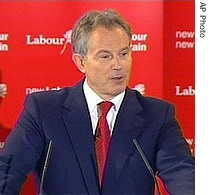2007年VOA标准英语-Blair to Step Down as Labour Party Leader; Hand
时间:2019-02-18 作者:英语课 分类:2007年VOA标准英语(五月)
London
10 May 2007
Britain's Prime Minister Tony Blair announced Thursday he is stepping down as leader of the Labour Party and will hand over power to a new prime minister June 27. VOA's Sonja Pace reports from London.
Tony Blair chose the town of Sedgefield, the heart of his constituency in northeast England, to make his long-awaited announcement.

Tony Blair announces he will step down as prime minister on June 27, 10 May 2007
"Today, I announce my decision to stand down from the leadership of the Labour Party," he said. "The party will now select a new leader. On the 27th of June I will tender my resignation from the office of prime minister to the Queen."
With these words, Mr. Blair began the transition of power. The Labour Party is expected to select current treasury 1 chief, chancellor 2 of the exchequer 3, Gordon Brown, as its new leader, paving the way for him to become prime minister on June 27.
Speaking to party members in Sedgefield, Mr. Blair said that after a decade in power it was time to go.
"I've been prime minister of this country for just over 10 years," he added. "In this job in the world of today, I think that's long enough for me, but more especially for the country."
Mr. Blair recounted some of his government's successes, including Britain's booming economy, improvements in health care, employment and social benefits. He also talked of foreign successes: intervention 4 in the civil conflicts in Kosovo and Sierra Leone. He spoke 5 of Britain's part in the fight against terrorism, in toppling the Taleban in Afghanistan and in ousting 6 Saddam Hussein from Iraq, although acknowledging Britain's involvement in Iraq remains 7 a deeply controversial issue.
Mr. Blair admitted not everyone agrees with the decisions he made over the past 10 years.
"I did what I thought was right," he said. "I may have been wrong; that's your call. But, believe one thing if nothing else, I did what I thought was right for our country."
Mr. Blair acknowledged that not all expectations he had come into office with had been fulfilled. He said some people might say the expectations were too high, but he said he would not have wanted it any other way.
- The Treasury was opposed in principle to the proposals.财政部原则上反对这些提案。
- This book is a treasury of useful information.这本书是有价值的信息宝库。
- They submitted their reports to the Chancellor yesterday.他们昨天向财政大臣递交了报告。
- He was regarded as the most successful Chancellor of modern times.他被认为是现代最成功的财政大臣。
- In Britain the Chancellor of the Exchequer deals with taxes and government spending.英国的财政大臣负责税务和政府的开支。
- This resulted in a considerable loss to the exchequer.这使国库遭受了重大损失。
- The government's intervention in this dispute will not help.政府对这场争论的干预不会起作用。
- Many people felt he would be hostile to the idea of foreign intervention.许多人觉得他会反对外来干预。
- They sourced the spoke nuts from our company.他们的轮辐螺帽是从我们公司获得的。
- The spokes of a wheel are the bars that connect the outer ring to the centre.辐条是轮子上连接外圈与中心的条棒。
- The resulting financial chaos led to the ousting of Bristol-Myers' s boss. 随后引发的财政混乱导致了百时美施贵宝的总裁下台。
- The ousting of the president has drawn widespread criticism across Latin America and the wider world. 洪都拉斯总统被驱逐时间引起拉丁美洲甚至全世界的广泛批评。